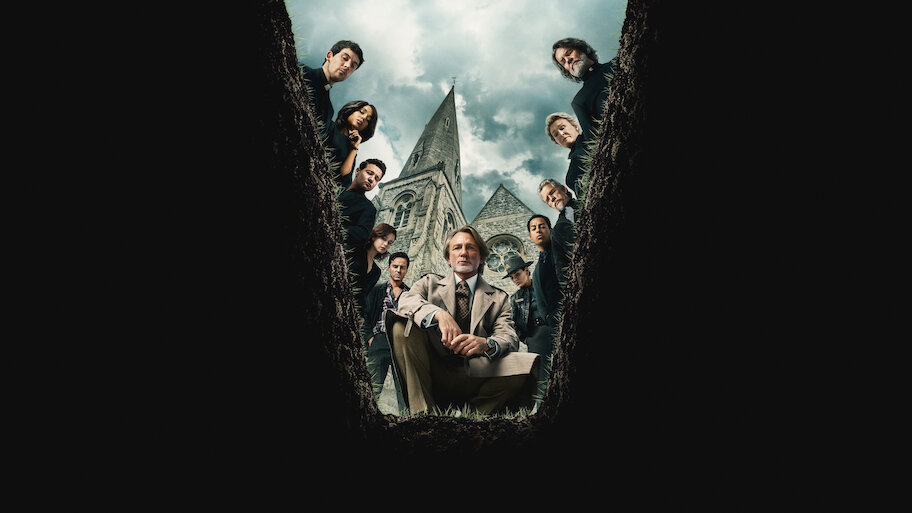Editor’s note: This review contains spoilers for ‘Wake Up Dead Man.’
Like clockwork, director Rian Johnson is back and as clever as ever with “Wake Up Dead Man,” the third installment of the Benoit Blanc mystery series. An intricate rumination on faith and mercy with a classic mystery setup to boot, “Wake Up Dead Man” explores the conflict between seeking absolution and achieving justice. In typical “Knives Out” fashion, Johnson infuses this film with witty satire on our current political climate, with each member of the ensemble fulfilling a different antagonistic archetype to highlight the dangers of living in a society marked by resentment.
The film follows Jud Duplenticy (Josh O’Connor), a young priest sent to work at Our Lady of Perpetual Fortitude, a small church in upstate New York. It’s led by Monsignor Jefferson Wicks (Josh Brolin), a charismatic older priest who exploits his congregants’ rage to maintain his own authority. Members of the church turn to Wicks to validate their personal grievances, who, in turn, frames their fury as a reflection of their piety.
Some, like Jud, are dealing with their own skeletons in the closet and yearn to leave the toxic atmosphere; others, like Nat Sharp (Jeremy Renner) and Lee Ross (Andrew Scott), bond over their anger toward an unfaithful ex-wife and liberal media, respectively, and long to maintain their tight-knit community. What do the churchgoers all have in common? An almost cult-like reverence for Wicks and a dark secret that he threatens to expose. When Wicks is found dead, everyone is made a suspect in famed detective Benoit Blanc’s (Daniel Craig) investigation.
I will note that I called who the killer would be as soon as their character was introduced, making the central mystery a little less tantalizing than it might have otherwise been. But Johnson’s elaborate use of misdirection still had me doubting my hunch until the final reveal. And, of course, the film was still filled to the brim with shocking revelations around every corner. The film’s title even serves as a reference to Wicks’ implausible resurrection on Easter Sunday.
Craig is delightful, as always, as Blanc, maintaining his trademark Southern drawl and references to show tunes throughout, but the real star of “Wake Up Dead Man” is O’Connor’s Jud. With sincere religious devotion and a wish to right his wrongs, O’Connor delivers an incredibly compelling performance as the earnest priest. O’Connor’s acting makes it easy to root for Jud to prove his innocence and escape Wicks’ vindictive church. Jud’s merciful nature toward the congregants is placed at odds with Blanc’s desire for justice, prompting a powerful discussion on whether one’s past transgressions can ever be forgiven, let alone forgotten.
The film’s religious setting works in tandem with Johnson’s tightly-written script to masterfully explore themes of sin, guilt, and the complexity of the past. Accompanied by a Gothic backdrop and mysterious backwoods, Our Lady of Perpetual Fortitude is the perfect environment to scrutinize each character and probe their true natures as they confess their sins.
This eerie setting also contributes to making “Wake Up Dead Man” arguably the darkest film in the saga yet. Cinematographer Steve Yedlin employs the classic shaky cam technique, and the methods of murder feel significantly more gruesome than past “Knives Out” films. However, this introspective darkness never comes at the expense of comedy. Sprinkled between musings on religion and faith are monologues by failed politician Cy (Daryl McCormack) on how he couldn’t connect with his voter base despite parroting conservative talking points about induction stoves, and extended descriptions of all the ways Wicks “pleasured” himself throughout the week.
Thematically, “Wake Up Dead Man” is easily my favorite film in the Benoit Blanc trilogy. At its core, it is a story about empathy and letting go of vengeance, its climax aptly subverting my expectations of a “Knives Out” film. Rather than a lengthy-yet-satisfying monologue from Blanc on how he solved the murder, ending with the killer receiving swift justice, we instead watch as Blanc chooses to step aside, allowing the killer to confess on their own terms. In doing so, “Wake Up Dead Man” goes beyond its murder mystery premise to stand out as a film that shows the negative consequences of allowing one’s vengeance to fester.
In a world governed by hate, in an era when people often refuse to take accountability for their actions, and in a time when forgiveness has become a rare commodity, “Wake Up Dead Man” is just the movie we need.
Rating: 5/5










